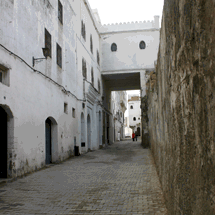 |
a walk through tangiers
To learn more about the ministry of Free Will Baptist International Missions, visit www.fwbgo.com. |
Walking along a narrow corridor between two whitewashed buildings, we closely follow our guide through a bewildering maze of alleyways. Phrases in Arabic drift from the nearby marketplace. The way grows busier with people, and a white-robed man appears in the doorway of a small shop. His intricate, white cap gleams in the dry Moroccan sun as he bends to spit at our traveling feet.
The man raises his head, quickly surveying the crowd before disappearing back into the shop from which he emerged. I have read that some pious Muslims refuse to swallow their spit during the fasting days of Ramadan, but to see it in person conjures to mind images of the Pharisees—white-washed tombs, as Jesus called them—praying loudly in the temple or rattling their change in the coffers.
Our day started early, five a.m. to be exact, but promised to be full of excitement and adventure. We drove down the coast of Spain for an hour before taking a 30-minute ferry across the Straight of Gibraltar to the northernmost Moroccan city of Tangier. The windy morning made for choppy waters and a ferry-load of sickened people—not our idea of a great start.
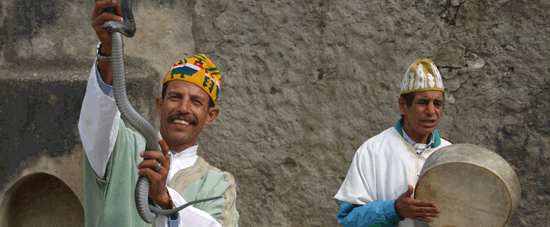
When our feet hit terra firma, we took a deep breath of fresh air and prepared to meet our guide for the day: a friendly, 60-something Arab named Hassan, gifted with languages and a knack for giving “safe” answers. For every question I have regarding his culture and Islam, he has an answer that rivals a politician’s in its diplomacy. Our day-trip coincides with the last day of Ramadan, the Muslim holy month of fasting, so I have many questions.
Our tour of Tangier began with a scenic drive above the old city, which stretched beneath us to the sea. Standing among expensive, exotic homes, we looked down on a dirty mass of white walls and tightly packed people. It was impossible to ignore the harsh dichotomy as we began our descent into the city.
Maybe that’s the point…
We pass a large, gated cemetery swarming with people carrying date branches in ceremonious honor of their deceased loved ones. We later learned this is a strictly Moroccan custom. An overwhelming sense of sadness fills me. For generations, thousands of people (including those buried here now) have visited this place in religious devotion with not the slightest chance of hearing of the assured hope of life in Jesus Christ. The vicious cycle of death without life and life without hope is starkly clear to me in this moment. My heart is deeply stirred for the multitude before me.
Our drive ends in the heart of the weathered city and we set off on foot through a dizzying labyrinth of streets, alleys, and courtyards. Our group stops briefly at a tiny bakery to taste the tempting date cookies the old baker pulls from his oven (a large opening in the side of a pit below street level). The odor is pleasant, but the taste is slightly disappointing—nothing here is as sweet as it looks.
Standing at the back of the group as various members descend into the bakery, I observe a couple of women washing their laundry at a small well in a nearby courtyard. Their hands are covered in orange dye—henna. Intricate tattoos on the hands of women are considered beautiful. Young girls and teenagers pass the time dying each other’s hands with ornate designs, but after many years of working with henna, the hands of the women before me are a solid hue. As they twist and wring the pile of clothing, I become immensely grateful for the washer and dryer that await us back home. Home. It seems so far away at the moment.
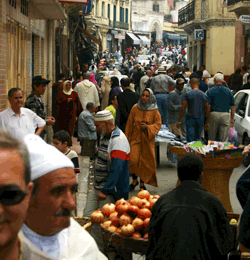 We move on quickly, stepping aside for the occasional moped as we work our way through passages and around corners. Apparently we have an appointment to make: an obligatory time-share presentation of sorts. “These rugs are exquisite, and cheap, very cheap… You want a magic carpet? We have those, too.” “These herbs will cure most anything. Do you snore? Have sinus trouble? Here is the solution to your problems. Take a whiff of this…” We move on quickly, stepping aside for the occasional moped as we work our way through passages and around corners. Apparently we have an appointment to make: an obligatory time-share presentation of sorts. “These rugs are exquisite, and cheap, very cheap… You want a magic carpet? We have those, too.” “These herbs will cure most anything. Do you snore? Have sinus trouble? Here is the solution to your problems. Take a whiff of this…”
I am amused at some of my companions who really buy into this stuff, even though it’s painfully obvious our “hosts” are just trying to take advantage of the “rich” tourists. If they only knew… This is not where I want to spend my precious time on Moroccan soil, so I am quite relieved to finally exit the small shop.
Foot traffic has picked up, and in the busy street the scent of food fills my nostrils. I suddenly realize how hungry I am. I’ve hardly noticed the pangs in the midst of so many new sights and sounds, but as we draw near a restaurant my salivary glands kick into overdrive. Grateful to be entering the aromatic building, we find our places in the vacant room. My stomach growls. At the same time, it dawns on me that our guide won’t partake with us today. He must be starving. I, of course, cannot withhold my curiosity, so I ask him how he feels about our eating lunch when he cannot because of the fast. “Religion is free,” he says. Safe answer.
I probe a little further, making sure he is aware that I am familiar with the strict tenets of Islam.
“No, it is not offensive. We choose our faith, just as you choose yours.”
I admire his diplomacy, but I know better. In a Muslim country, one is born into his faith, and it is against the law to convert. What about that makes religion free? Of course there are liberal Muslims who argue that theirs is a religion of peace, acceptance, and choice, but I am keenly aware that I am not among such believers. Not in North Africa. No, Islamic law governs the day here, which makes the fact that our trip coincides with the last day of Ramadan so interesting.
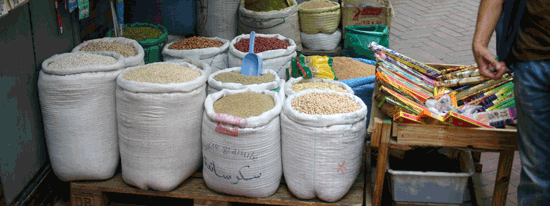
After feasting on chicken, kebabs, couscous, pastries, and mint tea, we embark both satisfied and curious to see what the afternoon holds. Reentering the marketplace, we are bombarded by street merchants peddling everything from jewelry to clothing to children’s toys. I make the mistake of eyeing something one of the men near me is holding out. He catches me looking and begins to negotiate in his thick accent. “Thirty euros.”
I tell him I’m not interested, although I haven’t quite made up my mind yet. He sees my hesitation and persists. “For you, twenty-five. Good price.” I shake my head and begin to walk away. He follows and says, “Okay, Okay, twenty-two euros. Is steal.” I avoid him, growing annoyed at his persistence. It’s a principle thing now. I reply, “No, so leave me alone.”
The man continues to follow us, intercepting our group at various stops along the way, and before we leave, his precious merchandise is worth a mere euro. I wonder how much we’ve overpaid for our other trifles.
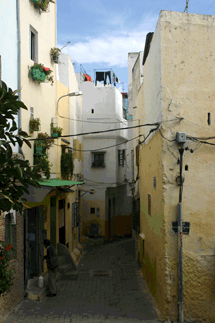 As we weave our way back through the long white passages, we encounter snake handlers, women giving henna tattoos, and more street merchants. We walk past an ornate tile mosaic that graces an old ritual bath no longer in use. We smell, and then see, a small cart with today’s fresh fish. On a door nearby, we notice a knocker with the now-familiar shape: the hand of Fatimah (Mohammad’s daughter), believed to ward off the evil eye. We catch the last echoes of a call to prayer, pass a gleaming white mosque with its towering minaret, and glimpse a courtyard full of small children at play while veiled mothers chat nearby. My senses are filled as I breathe and try to soak in every drop of this culture. Our adventure is coming to a close and I don’t want to soon forget it. As we weave our way back through the long white passages, we encounter snake handlers, women giving henna tattoos, and more street merchants. We walk past an ornate tile mosaic that graces an old ritual bath no longer in use. We smell, and then see, a small cart with today’s fresh fish. On a door nearby, we notice a knocker with the now-familiar shape: the hand of Fatimah (Mohammad’s daughter), believed to ward off the evil eye. We catch the last echoes of a call to prayer, pass a gleaming white mosque with its towering minaret, and glimpse a courtyard full of small children at play while veiled mothers chat nearby. My senses are filled as I breathe and try to soak in every drop of this culture. Our adventure is coming to a close and I don’t want to soon forget it.
As dusk settles over the city, we return to port. We’re tired, hungry, and ready to get back to Spain. Expecting to leave in 30 minutes, we settle down to wait for the ferry with the other passengers. As time passes, and the crowd grows, we wonder if something has happened to our boat.
Suddenly, I realize the cause of our delay. After the sun goes down, the fast is over. Families, friends, and neighbors gather to eat. The month of Ramadan is a festive time in Morocco, with evening celebrations in the streets, and it appears the men who operate our ferry have decided to join in. I don’t blame them. They haven’t eaten all day. If they’re like the pious man we saw, they haven’t even swallowed their spit.
Rather than begrudging their negligent tardiness, I take a moment to pray that one day they’ll hear the Truth. Two hours later, we finally depart for home and the familiar. It’s well past midnight by the time we reach bed, but I still find it hard to sleep after my first taste of Morocco. Mine is a first impression with a lasting impact, and I pray it has changed me forever.
About the Writer: Written by a woman following her visit to the North African country.
10 Ways to Witness to Muslims
-
Pray for them, for barriers to be broken down, and for hearts to be open to Truth
-
Live a godly life.
-
Show them love, kindness, and hospitality.
-
Let them know if you are praying for them.
-
Give your testimony when the door opens.
-
Build up Christ, rather than tearing down Mohammad.
-
Give them a Bible; they will usually read it.
-
Study their religion.
-
Invite them to your home, gatherings, and church functions.
-
Don’t underestimate God.
|

